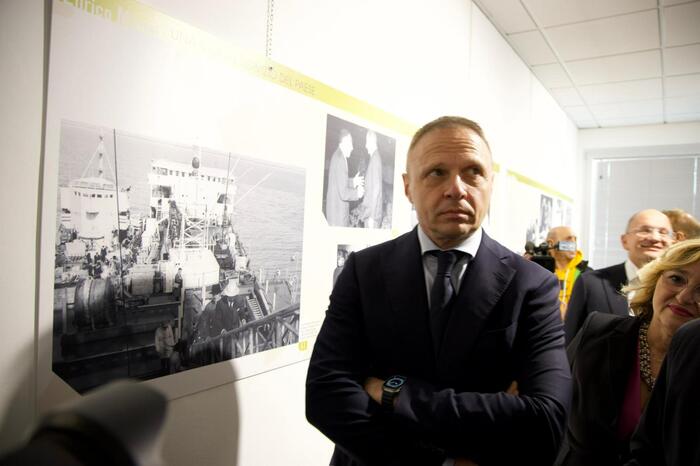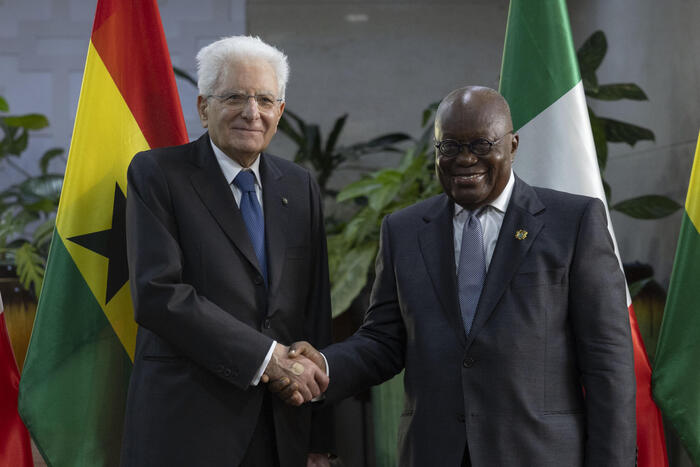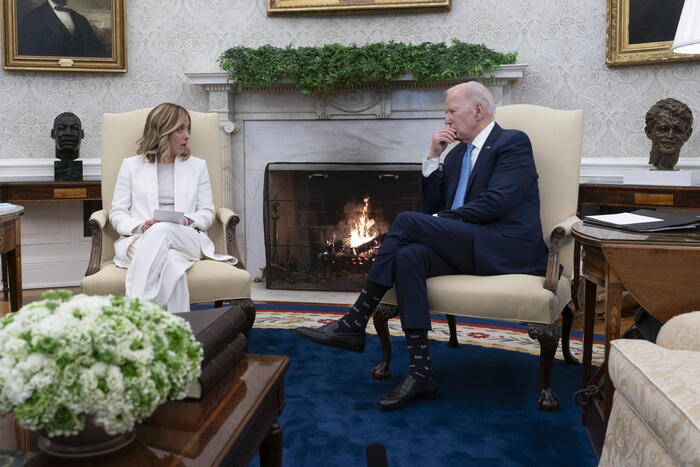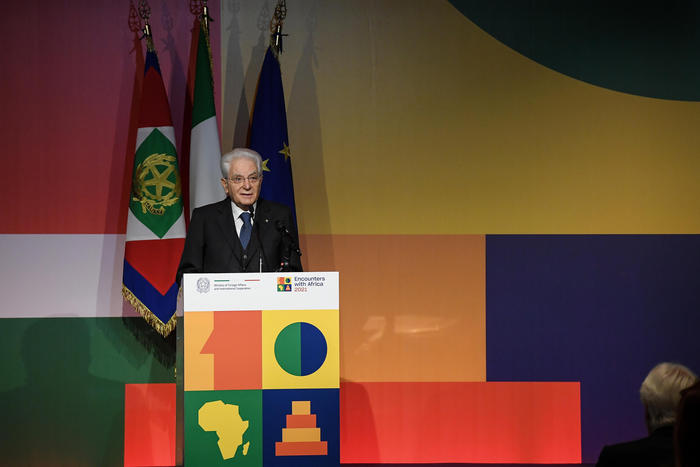Enlarge image
South Africa's Foreign Minister Naledi Pandor welcomes Russian Foreign Minister Sergei Lavrov in Pretoria on Monday
Photo: IMAGO/Russian Foreign Ministry Press S / IMAGO/ITAR-TASS
The Foreign Office's Twitter team has landed a small scoop, at least as far as reach is concerned.
This tweet has already been viewed almost two million times:
The Russian foreign minister traveled to Africa this week not to see leopards but to spread his propaganda, it said.
The leopard is depicted as an animal emoji, which the ministry's social media managers thought was funny.
But people across the African continent are once again wondering: What image does »the West« actually have of us?
A spokeswoman for the African Union asked on Twitter if Annalena Baerbock was only traveling to Africa to see animals.
"Is the African continent (...) a joke for you?"
When a German diplomat replies that there may be a misunderstanding - the leopard emoji means the tank and not the African animal life, she replies: "I got it right.
A State Department using sickening colonial clichés to make geopolitical points.” Ouch.
You can dismiss that as petitesse, as a failed gag, it just happens on social media.
But unfortunately it's not that simple.
On the one hand, the tweet spreads widely and causes real damage.
In many African countries people react – rightly – in a very snooty way to such clichés, and a German foreign ministry should know that too.
Far too often in Europe, the continent is reduced to supposed wilderness, “endless expanse” and ethno-clichés of Maasai warriors with spears.
German delegations visiting the continent also like to plan the safari first and then the tedious mandatory visits around.
Many African countries do not want to take sides in the Ukraine war
But the small scandal comes at the wrong time: Germany would like to have more African partners at its side when it comes to the Ukraine war.
When a resolution was put to the vote at the United Nations in March 2022 to condemn the invasion of Ukraine, just under 51 percent of African countries voted in favor.
Many observers from Germany reacted with incomprehension and astonishment.
When Chancellor Olaf Scholz visited Senegal in May last year, the German delegation was annoyed: President Macky Sall blamed the sanctions against Russia for the hunger in Africa and not Vladimir Putin, who blocked Ukrainian grain deliveries.
Sometimes it seems as if Europe regards the continent as an ungrateful niece,
Many African countries do not want to take sides in this war.
This is often difficult to understand from a European point of view, since the moral dimension seems clear.
But many African states have little use for such a view.
For where was the outcry during Ethiopia's civil war?
Or, as it were, the western original sin: Why didn't anyone stop the genocide in Rwanda in 1994?
So the Global North does not need to come up with morality, no matter how clearly the perpetrators and victims of this war in Ukraine can be assigned.
During the Cold War, the countries of the Global North saw Africa as a political pawn, on the Soviet, European and American sides.
Western secret services helped to overthrow elected heads of government, the supposed protecting powers financed rebel troops and continued to destabilize many countries.
This is burned deep into the collective memory.
Today the attitude is different: people want to choose their partners themselves, not take sides, weigh up options.
Unfortunately, corruption all too often prevents a real awakening from emerging.
Russia, on the other hand, is targeting anti-Western resentment on the continent with tailor-made propaganda.
Moscow has never stained itself with the blood of colonialism, Foreign Minister Sergey Lavrov wrote in a guest article for several African newspapers in July last year.
While many regions in Eurasia subjugated by Moscow might see it differently, in Africa the narrative is getting caught.
It is artificially inflated by paid influencers and bot armies.
In some African countries, Europe no longer has a say
Russia is presenting itself as an equal partner who is finally taking the continent seriously.
In view of the atrocities committed by the Wagner mercenaries in Africa, this is pure mockery, as many heads of government know.
Nevertheless, they are handling the matter very pragmatically: After meeting Olaf Scholz, Senegalese President Macky Sall flew to Moscow to visit Vladimir Putin.
The truth is: In some African countries, Europe no longer has anything to report in the medium term.
In Mali or the Central African Republic, for example, former French colonies that have turned away from Paris and increasingly towards Moscow.
Most countries are trying to keep a balance between Asia and "the West", and they don't want to do without arms deliveries from Moscow, roads from China or solar power plants from Europe.
You really can't blame them in the face of centuries of slavery, colonial oppression and Cold War vested interests.
It is your right.
The German government should therefore also reconsider the messages it is sending in Africa.
A failed tweet about leopards and Russia is more than just a bad joke, as you can see from the outraged reactions of people who are otherwise not really inclined to polemics.
What Europe can do instead: Make good offers.
Europe depends on Africa.
Not only because of the valuable resources such as lithium or cobalt, without which climate change can hardly be stopped.
Population growth is also accompanied by a growing number of potential consumers – as was the case in China before – which many companies will hardly be able to ignore in the future.
In recent years, these people have tended to be seen as an army of would-be migrants who must be prevented from crossing the Mediterranean at all costs.
This week the German development ministry presented a new Africa strategy.
And this is actually a paradigm shift.
It is not just empty phrases that can be read about a »partnership on an equal footing«, as it has been preached for years but not implemented.
The strategy is based on the goals of the African Union, so it is based on the wishes of the African governments themselves. That sounds banal, but it is a real upheaval.
So far, the countless development projects on the continent have often been conceived at European desks.
In the African reality, they failed rigorously.
Many other points are also convincing: energy partnerships, financing mechanisms for innovative companies, a focus on the continent's booming cities.
It is perfectly legitimate to insist on good governance, the fight against corruption and transparency.
But maybe the Development Ministry should send this strategy paper to the Foreign Office again, just to be on the safe side.
It doesn't seem to have gotten to the social media team, at least.
In the meantime, the Federal Foreign Office has at least responded to the criticism – and apologizes in another tweet:
The spokeswoman for the African Union reacted promptly: “Don't apologize.
Just be careful.
And respect us as we respect you.”
This contribution is part of the Global Society project
Expand areaWhat is the Global Society project?
Under the title »Global Society«, reporters from
Asia, Africa, Latin America and Europe
report on injustices in a globalized world, socio-political challenges and sustainable development.
The reports, analyses, photo series, videos and podcasts appear in a separate section in the foreign section of SPIEGEL.
The project is long-term and is supported by the Bill & Melinda Gates Foundation (BMGF).
A detailed FAQ with questions and answers about the project can be found here.
AreaWhat does the funding look like in concrete terms?open
The Bill & Melinda Gates Foundation (BMGF) has been supporting the project since 2019 for an initial period of three years with a total of around 2.3 million euros - around 760,000 euros per year.
In 2021, the project was extended by almost three and a half years until spring 2025 under the same conditions.
AreaIs the journalistic content independent of the foundation?open
Yes.
The editorial content is created without the influence of the Gates Foundation.
AreaDo other media also have similar projects?open
Yes.
Major European media outlets such as The Guardian and El País have set up similar sections on their news sites with Global Development and Planeta Futuro, respectively, with the support of the Gates Foundation.
Did SPIEGEL already have similar projects? open
In recent years, SPIEGEL has already implemented two projects with the European Journalism Center (EJC) and the support of the Bill & Melinda Gates Foundation: the "OverMorgen Expedition" on global sustainability goals and the journalistic refugee project "The New Arrivals ", within the framework of which several award-winning multimedia reports on the topics of migration and flight have been created.
Expand areaWhere can I find all publications on the Global Society?
The pieces can be found at SPIEGEL on the Global Society topic page.








